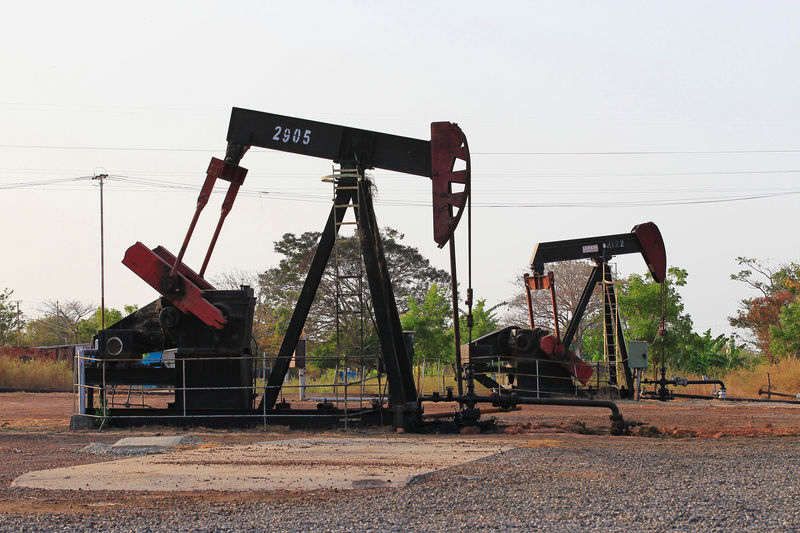By Jessica Resnick-Ault
NEW YORK (Reuters) - More than 24 hours after the United States announced large-scale sanctions on Venezuela's nationally owned oil company, merchant trading firms and refiners were still deciphering what the measures prohibited.
The sanctions, announced on Monday, are aimed at driving President Nicolas Maduro from power, the strongest U.S. measures yet against the socialist president who has overseen economic collapse and an exodus of millions of Venezuelans in recent years.
Traders who sell Venezuelan crude to the United States are looking for avenues to keep crude flowing during the sanctions, according to people familiar with the discussions, while U.S. companies who buy Venezuelan oil have also been looking for work-arounds, seeking counsel for instance on whether the use of third party intermediaries, such as commodity merchants, can continue.
The sanctions https://www.reuters.com/article/us-venezuela-politics-usa-sanctions-fact/factbox-u-s-sanctions-on-venezuelas-oil-industry-idUSKCN1PN34I froze assets of state-run PDVSA and require U.S. firms to pay for oil using accounts controlled by the country's opposition party head and self-proclaimed interim president, Juan Guaido.
PDVSA is seeking to sidestep the restrictions by asking major buyers, including U.S. refiners, to renegotiate contracts, sources said.
Oil sanctions in the past have been evaded by using intermediaries, said Scott Maberry, who specializes in international trade at Sheppard Mullin law firm, but he doubted that would happen with PDVSA. "I would not be surprised if this administration is vigilant and does not feel bound by past practices," said Maberry.
A U.S. Department of Treasury spokesman called the sanctions against PDVSA "extremely sophisticated," adding that the department would "take questions from industry and stakeholders and issue FAQs as appropriate."
No FAQ (frequently asked questions) had been issued by Tuesday evening.
Via PDVSA, Venezuela exports about 500,000 barrels of oil daily to the United States, mostly to PDVSA subsidiary Citgo Petroleum and U.S. companies Valero Energy Corp (NYSE:VLO) and Chevron Corp. (NYSE:CVX) It also imports products from the United States.
The sanctions not only limit U.S. companies from paying PDVSA for crude, but also oil sales moved through multiple third parties, such as potential arrangements involving sending oil to Russia or China, which would later sell to an intermediary that would pass the oil on to U.S. buyers.
Intermediaries that comply with U.S. sanctions in general and transact in U.S. dollars would still be subject to the Venezuela sanctions. Transactions sent through a multitude of parties would only be allowed if the revenues were sent to accounts inaccessible by Maduro's government, according to a source familiar with the sanctions.
"Treasury will be tracking this closely. The idea that this can get laundered and not tracked is far-fetched," said Joe McMonigle, senior energy policy analyst at Hedgeye in Washington and a former Energy Department official under President George W. Bush.
The Trump administration has said the restrictions should have a minimal impact on the U.S. consumer, but some experts said they were concerned there could be unanticipated effects.
"PDVSA has so many intertwined dealings and transactions with the U.S., including through Citgo, that the immediate impact of these sanctions is far more comprehensive on the U.S. economy than you would typically see," said Scott Flicker, chair of the Washington office of law firm Paul Hastings and head of the firm's global trade controls practice.
The United States exempted Citgo from sanctions until July 27. However, previous sanctions have already prevented Citgo from sending PDVSA its profits, which had been paid to the parent in the form of dividends. Analysts at Tudor, Pickering & Holt said that if Citgo was unable to import Venezuelan barrels, "some sort of impact on operations seems like a distinct possibility."
U.S. refiners last week asked the administration not to issue sanctions, according to a letter seen by Reuters on Tuesday.

"Such a ban would further tighten the heavy sour crude market in the United States, resulting in higher crude prices for U.S. refineries and higher fuel costs for U.S. consumers," the American Fuel & Petrochemical Manufacturers, a trade association, said in a Jan. 23 letter to President Donald Trump.